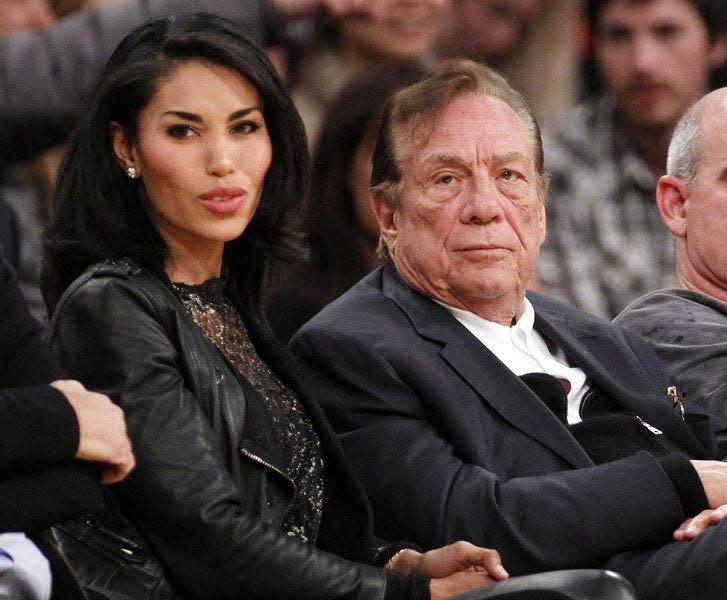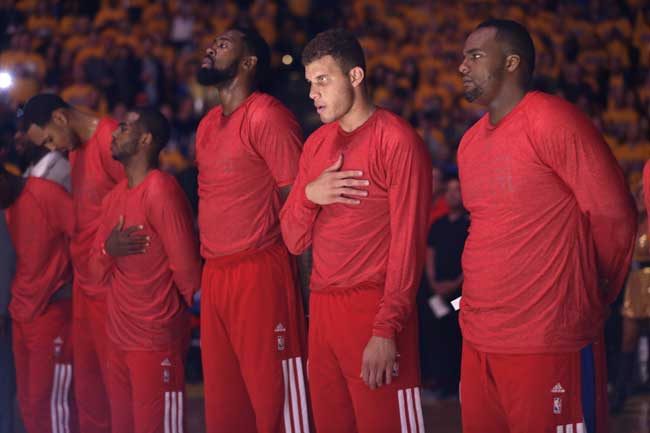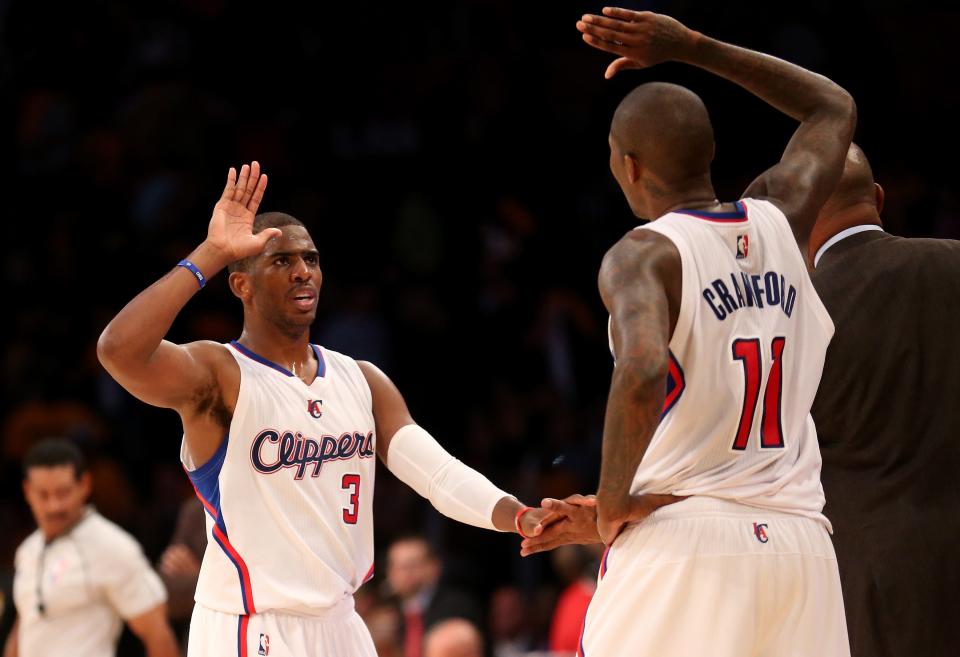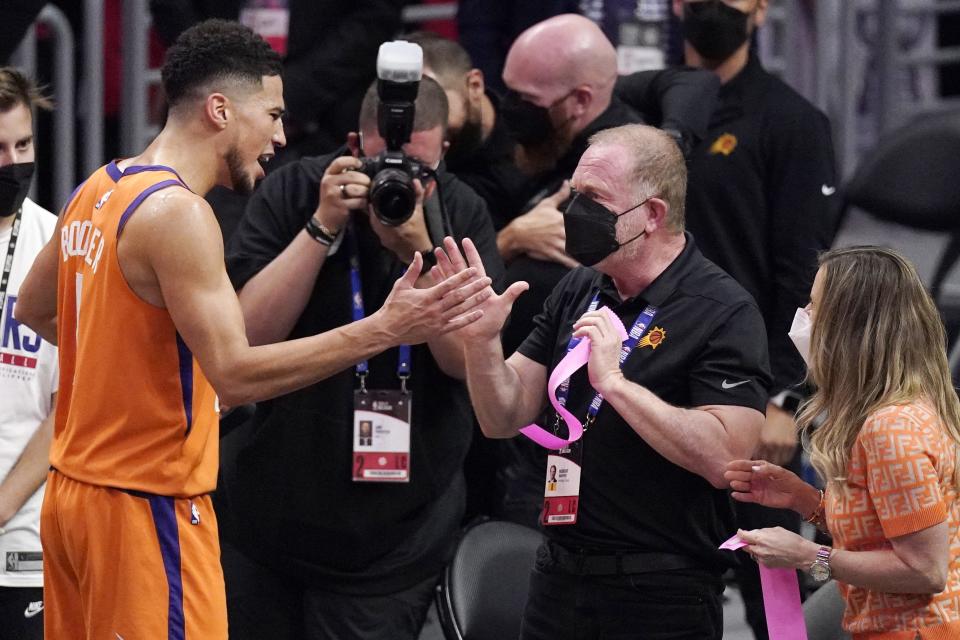Robert Sarver vs. Donald Sterling: Both NBA owners behaved badly, so why was only one banned for life?
- Oops!Something went wrong.Please try again later.
- Oops!Something went wrong.Please try again later.
- Oops!Something went wrong.Please try again later.
- Oops!Something went wrong.Please try again later.
The actions announced by the NBA Tuesday against Robert Sarver for repeated instances of workplace misconduct that included racist remarks, sexually inappropriate comments and bullying drew immediate comparisons to another controversy involving a team owner.
Former players, fans and media quickly cited former Los Angeles Clippers owner Donald Sterling, who was caught on tape making racist remarks in April 2014. That led to protests from players and other groups, leading to Sterling's lifetime banishment from the league by NBA Commissioner Adam Silver. Sterling soon after was forced to sell the franchise.
On Tuesday, the league's front office revealed the results of its investigation into Sarver, majority owner of the Phoenix Suns and Phoenix Mercury of the WNBA, which confirmed many of the allegations first reported in a November 2021 ESPN article.
Sarver was suspended for one year from all activities involving both franchises and is not allowed to be present at any event or facility related to either team. He also was ordered to pay the league's maximum fine of $10 million, and is required to "complete a training program focused on respect and appropriate conduct in the workplace."
More: NBA suspends Sarver for one year, fines him $10 million after investigation
The NBA today issued the following statement: pic.twitter.com/jjlBK771PT
— NBA Communications (@NBAPR) September 13, 2022
The league's statement about Sarver's case was accompanied by a 43-page report from its 320 interviews of current and former employees, and more than 80,000 documents including emails, text messages and videos to help it reach its conclusions. The report confirmed that Sarver:
Said "the N-word when recounting the statements of others" at least five times, including an incident when Sarver was warned by former Suns coach Earl Watson to not repeat it after Warriors' Draymond Green said it during a game in Phoenix.
Made sex-related comments, including a joke about his genitals to a female employee.
Asked a female employee if she got a breast augmentation "upgrade."
Pulled down the pants of an employee in front of other males and in front of Sun team members.
Said he "hates diversity" to a coach in 2014.
Yelled and cursed at employees with "demeaning, and "harsh” language, which was deemed as "bullying" and "violated common workplace standards, as reflected in team and League rules and policies.
Unlike Sterling, Sarver was not banished for life and he remains majority owner of both the Suns and Mercury franchises.
Sarver issued a statement apologizing to anyone offended by his actions, but saying he disagreed with some of the investigation "particulars.'' When the ESPN report first came out last year, Sarver strongly denied the allegations and said he welcomed the league's investigation.
Read more: Sarver calls allegations of racism, misogyny in ESPN article 'inaccurate' and 'misleading'
Two owners, different outcomes
So how does the Sarver case differ from the Sterling case? Why were the penalties different?
On Wednesday, Silver addressed the matter, saying a key difference is that there is evidence Sarver ''has evolved'' as a person and many of the offenses cited in the report occurred earlier in his tenure as owner. He also noted that in Sterling's case, the league had firsthand evidence, a recording, of the offensive comments.
MORE: Commissioner Adam Silver talks about Sarver-Sterling comaprisons
In addition to banning Sterling, Silver fined him the then-maximum $2.5 million within a week after TMZ published several leaked private audio recordings of Sterling's racist comments in phone conversations with his then-girlfriend V. Stiviano.

Sterling chided her for "associating with Black people," and bringing her Black friends such as Magic Johnson to the team's home games.
When Sterling's long history of racist behavior was publicized, the instances didn't surprise many people who worked close to him, including late former Clippers manager and Lakers legend Elgin Baylor, who sued the organization for wrongful termination as well as age and racial discrimination in 2009.
Four days after the Sterling audio recordings came out, the Clippers, which were led by future Suns All-Star Chris Paul, and the Warriors contemplated boycotting Game 5 of their Western Conference playoffs first round. But the Clippers ultimately decided to play, and they did a brief team protest by huddling together at mid-court and throwing off their inside-out Clippers warmup t-shirts in unison before the tip-off.

Sterling's then-wife Shelly Sterling was a co-owner who eventually sold the team after Silver pushed for an NBA Board of Governors' three-fourths majority vote needed to force a team sale from an owner, per the league's by-laws.
Even though she and her husband weren't willing to sell the team, and despite her not being part of her ex-husband's ban, the by-laws state "if a controlling owner's interest is terminated by a three-fourths vote, all other team owners' interests are automatically terminated as well."
The Suns Legacy Partners LLC is the group that owns the Suns franchise, and also operates the Mercury and Footprint Center. Sarver is majority owner, but the group includes about a dozen other partners — among them former Arizona Cardinal Larry Fitzgerald — who own minority percentages of the teams. Most of the partners signed a statement in support of Sarver soon after the ESPN report came out.
Related: Phoenix Suns partners sign statement disputing allegations against Sarver
Former players don't see a difference
After Sarver's penalty was revealed, retired player Jamal Crawford, who played for the Clippers during the Sterling scandal and the Suns during the 2018-19 season, posted two tweets that said, "Sterling 2.0" and "Seen this movie before" with a sad face emoji.

Other former Suns employees and retired players believe Sarver's punishment is weak.
Many NBA commentators and some former players, along with others on Twitter criticized the Sarver punishment as too weak, suggesting he should face the same punishment as Sterling.
Read more: NBA blasted on social media for weak punishment of Sarver
Just like Rev. Al Sharpton's push for Sarver's expulsion, retired player and Phoenix native Richard Jefferson said on Tuesday on ESPN's NBA Today he believes Sarver should be out of the league forever.
“It wasn’t other places he was doing this. He was literally doing this inside of an NBA organization," Jefferson said. "He was insulting fans, he was insulting female employees, he was literally doing every single thing in an HR meeting that you do not do. And he was the head of this organization."
Jefferson added that similar to Sterling, the league's findings of Sarver's behavior were expected by many former Suns players he personally knows.
"These are just a bunch of things that showed up in the report," Jefferson said. "They didn’t get everything in the report. They just got what people were willing to tell them. I know that there was so much more.”
But despite the investigation's findings, the league didn't cite any of Sarver's misconduct to be "motivated by racial or gender-based animus."
The league's report claimed his racially insensitive and misogynistic behavior as "sophomoric" and "awkward" humor as too crude for the workplace.
Ex-Suns event planning manager Ashley Silva, who tweeted the day prior to the Sarver ruling, said she was ''traumatized'' by the Sarver probe's long process, tweeted again that she was "extremely disappointed" in the NBA's decision and called Sarver's punishment a "slap on the wrist."
Read more: "Traumatized all over again'' Former Suns employee calls out NBA over status of Sarver probe
It’s not nearly enough, but it’s a starting point. While I am extremely disappointed in this slap on the wrist, I’m validated to know the findings showed what we’ve been speaking about for years. More needs to be done. https://t.co/WE0tU8JJg0
— Ashley ✨ she/her/hers (@godessofvictry) September 13, 2022
Hey @Suns fans, mad about the slap on the wrist? As someone who endured the treatment longer than the actual punishment - me too! So what’s next? Keep up the pressure. Keep amplifying the brave folks speaking up. Demand better for your team and community.
— Ashley ✨ she/her/hers (@godessofvictry) September 13, 2022
Securing a three-fourths vote from the NBA Board of Governors — which is made up of the team owners — to get rid of an owner is extremely difficult.
"I don’t believe that the NBA could do more than what they did, even putting it to a vote because owners don’t want all of their stuff exposed," Jefferson said.
"If you have achieved billions of dollars and you own NBA teams, if people start digging in your closets, they might find stuff. So I think to get that 75 percent vote is going to be very difficult, so they looked at it and this is the most that we can do. So to me, it all goes up to the players now."
One difference between Sarver and Sterling is the former's case took nearly a year because of reviewing cases of he-said, she-said. That's unlike what was heard loud and clear in the latter case, which instantly made Silver want to push Sterling out after causing a public outcry led by players.
Another difference is that one prominent female in the Mercury organization, former coach Sandy Brondello, defended Sarver as "the best owner" when the allegations arose.
More for subscribers: Somers: Why is Sarver still owner of Suns, Mercury?

The Suns' best player Devin Booker, who has a close relationship with Sarver, told The Republic around that same time he never heard of an incident of Sarver using the N-word around former coach Earl Watson, as alleged in the ESPN report, or during his seven years in Phoenix. However, Booker assured that doesn't make him "insensitive to the subject."
Sterling had no one come to his defense during his scandal. Especially after his hollow apology during a CNN interview with Anderson Cooper in which he disparaged Magic Johnson for being HIV positive and claimed the Lakers icon does nothing for the African-American community.
Sarver's ownership is now on the sidelines for a year. But if Suns and Mercury players, or others in the NBA begin raising their voices in protest, things could change yet again.
Have tips for us? Reach the reporter at dana.scott@azcentral.com or at 480-486-4721. Follow his Twitter @iam_DanaScott.
Support local journalism. Start your online subscription today.
This article originally appeared on Arizona Republic: How NBA's Robert Sarver, Donald Sterling investigations are different

